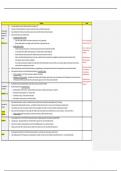Theories Notes
• As society changes, the type of family required for it changes to fit
• Functions of the family depend on the needs of society and functions will affect family structure
Functional fit
• Said extended family fit needs of preindustrial society and nuclear family fits needs of industrial society
theory and 2
functions of • Said industrial society has 2 essential needs:
family → Geographically mobile workforce
- Easier for compact nuclear fam to move to where jobs are, only 2 generations Fem – family actually
Parsons (Func) - Before, people stayed in same village, worked at same farm so larger family was okay meets needs of men
→ Socially mobile workforce
Marx – meets needs
- Modern industrial society based on constantly evolving science/tech which needs skilled workforce
of capitalism not
- Its essential that those skilled, talented people can be socially mobile no matter background members
- Nuclear family better fits this society where children leave home and form their own family
- Before, extended family kept people close to home (eg. working for father) as people had more obligations towards them and duty to help each other Rose tinted view of
- More isolated nuclear family has less obligations the family, ignores
- Since modern society allows for people to be socially mobile, the extended family could cause conflict as sons could have higher achieved status than fathers so dark side
nuclear family more suited because sons leave
Other types of family
• Said that industrialisation meant the family lost functions e.g. stopped being unit of production and became unit of consumption when work moved into factories
can also perform
• After losing those functions, nuclear family became specialised in 2 essential functions: these functions,
→ Primary socialisation – basic skills, norms/values, integration, cooperation outdated theory
→ Stabilisation of adult personalities – emotional security within marital relationship, release tension, relax, meet emotional needs of breadwinner so they return to work
refreshed (warm bath theory) which benefits economy, family supports each other which prevents dysfunction Too deterministic –
assumes people will
• Studied 200 societies and determined the nuclear family is universal, found in all of them follow n/v
4 functions of • Nuclear family performs 4 essential functions:
the Family
→ Stable satisfaction of the sex drive – prevents disruption caused by sexual freedom, kept between same partner
Murdock (Func) → Reproduction of next generation – to continue society
→ Socialisation of young – teach shared norms/values
→ Meet member’s economic needs – provide food, shelter
• Said preindustrial family was nuclear, not extended as Parson claimed, parents and children worked together such for weaving
Evaluation of • Disagreed industrialisation bought nuclear fam – said hardship of industrial period meant rise in mum-centred working class extended families
Parsons
• These families were based on ties between mothers and married daughters who relied on each other financially, emotionally and practically
Young & • Argue nuclear family emerged from social changes after 1900 that decreased importance of extended family as a source of support – meant less need for it
Willmott → Changes included: higher living standards, married women working, welfare state, better housing
• Used exchange theory in study of Preston during industrial period to explain popularity of working class extended family
Anderson • Exchange theory – idea people break off or maintain family ties based on the costs and benefits involved
• Said the harsh conditions of industrialisation meant that it benefitted people more to maintain family ties
• People would use older kin for childcare, taking in relatives meant extra income to the household, help towards rent
• Studied English households from 1564-1821 (preindustrial period) – found they were almost always nuclear families
Laslett • Late childbearing and short life expectancy meant grandparents unlikely to be alive for much long after first grandchild was born – so less extended families




